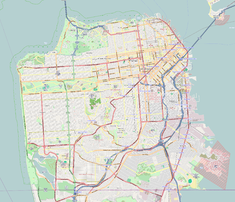| Metro Theatre | |
|---|---|
 Metro Theatre in 2005 Metro Theatre in 2005 | |
| Location | 2055 Union Street, San Francisco, California, U.S. |
| Coordinates | 37°47′50″N 122°25′59″W / 37.797304°N 122.433134°W / 37.797304; -122.433134 |
| Built | 1924; 101 years ago (1924) |
| Built for | Samuel H. Levin |
| Architect | Reid Brothers |
| Architectural style(s) | Spanish colonial revival, Art Deco |
| San Francisco Designated Landmark | |
| Designated | July 21, 2009 |
| Reference no. | 261 |
 | |
The Metro Theatre is a historic 1924 building and former single screen theatre in the Cow Hollow neighborhood of San Francisco, California, U.S.. The building was listed by the city as a San Francisco Designated Landmark in June 21, 2009; and has a historic marker. It is also known as the Metro Theater, and the Metropolitan Theater. The building is now used as a private gym.
History
The Metropolitan Theatre was designed in the Spanish colonial revival style by the Reid Brothers (James Reid and Merritt Reid). It opened on April 23, 1924 as a second run theater, by Samuel H. Levin of San Francisco Theatres Inc., who also owned the Alexandria and Coliseum theaters in San Francisco. The first film shown was The Fighting Coward (1924), a silent film directed by James Cruze.
In 1941, the building was remodeled in an Art Deco style by Otto A. Deichmann and Timothy L. Pflueger. After the remodel, the name was shortened to "Metro Theatre". In the 1950s the reputation of the theatre increased after being the venue for the first San Francisco International Film Festival on December 4–18, 1957. Films screened at the first festival included The Captain from Köpenick (1956 film).
In March 1992 during the release of the erotic thriller film Basic Instinct (1992), women's groups such as the National Organization of Women (NOW) and queer groups in San Francisco and Los Angeles protested the depiction of women and violent queer love in this film. The Metro Theatre in San Francisco saw one of the largest protests on opening night, with some 100 protestors. In 1998, the building had a renovation to preserve the theatre back to the state of the 1941 Art Deco style.
It was part of the Regal Entertainment Group before its closure in 2006. In 2009, a property developer committed to preserving the interior murals by Anthony Heinsbergen, ioinic columns, grilles and urns; and the building was converted in to a private gym.
See also
References
- "Metro Theater Building Historical Marker". Historic Marker Database. Retrieved 2024-03-11.
- ^ "San Francisco Landmark #261: Metro Theater". noehill.com. Retrieved 2024-03-11.
- ^ "Metro Theatre in San Francisco, CA". Cinema Treasures. Retrieved 2024-03-11.
- ^ Tillmany, Jack (2005). Theatres of San Francisco. Arcadia Publishing. p. 97. ISBN 978-0-7385-3020-8.
- ^ Richards, Rand (2002). Historic Walks in San Francisco: 18 Trails Through the City's Past. Heritage House Publishers. pp. 74–75. ISBN 978-1-879367-03-6.
- Lee, Sangjoon (2020-12-15). Cinema and the Cultural Cold War: US Diplomacy and the Origins of the Asian Cinema Network. Cornell University Press. p. 117. ISBN 978-1-5017-5232-2.
- Robertson, Patrick (2011-11-11). Robertson's Book of Firsts: Who Did What for the First Time. Bloomsbury Publishing USA. pp. 336–337. ISBN 978-1-60819-738-5.
- ^ Couvares, Francis G. (2006). Movie Censorship and American Culture. University of Massachusetts Press. pp. 297–298. ISBN 978-1-55849-575-3.
| Movie theaters in San Francisco | |
|---|---|
| Open | |
| Defunct | |
| Repurposed | |
- Cinemas and movie theaters in the San Francisco Bay Area
- Former cinemas and movie theaters in California
- Theatres in San Francisco
- Theatres completed in 1924
- San Francisco Designated Landmarks
- Art Deco architecture in California
- Art Deco cinemas and movie theaters
- Spanish Colonial Revival architecture in California
- Spanish Colonial Revival cinemas and movie theaters